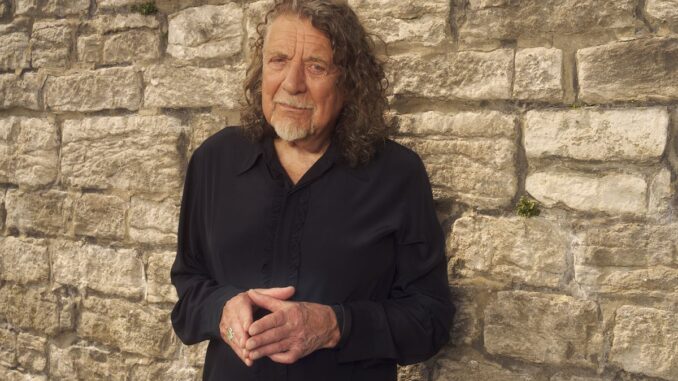
HEARTBREAKING MOMENT: A Silence That Spoke Louder Than Any Song..
Earlier today in the quiet village of Rushock, Worcestershire, a scene unfolded that will forever echo in the hearts of music lovers worldwide. There were no reporters, no cameras flashing, and no stage lights — only the gray winter sky, the faint rustle of leaves, and the sound of footsteps on cold, damp earth. Robert Plant, the golden voice of Led Zeppelin, stood alone before the gravestone of his lifelong friend and bandmate, John Henry Bonham.
Bonham — or simply “Bonzo,” as his friends and fans called him — was more than just a drummer. He was a force of nature. From the thunderous opening of “Good Times Bad Times” to the legendary solo of “Moby Dick,” his sound was both primal and profound, a heartbeat that carried Zeppelin’s music beyond rock and into eternity. Today, that heartbeat was felt once more, not through a drum kit, but through a silence so powerful it could move mountains.
Plant arrived quietly, almost unrecognizable beneath a wool coat and scarf. The air was sharp, the clouds heavy with the promise of rain. He carried a single white rose — simple, pure, and weighty with memory. Kneeling down, he placed it gently upon Bonham’s stone. The name engraved in the granite — John Henry Bonham, 1948–1980 — seemed to glisten faintly, as though acknowledging his presence.
“He’s still here,” Plant murmured, his voice trembling with emotion. “Everywhere… he’s still here.”
Those few words cut deeper than any lyric. They were the unspoken truth shared by countless fans who have felt Bonham’s presence in every beat, every echo, every song that refuses to fade.
A Brotherhood Beyond Music
For Robert Plant and John Bonham, their story began long before the fame, long before Led Zeppelin was even a thought. They were two lads from the English Midlands — both fiery, both passionate, and both fiercely devoted to their craft. Plant’s voice was like no other, soaring and soulful, while Bonham’s drumming carried the weight of thunder and the pulse of the earth.
When fate brought them together under Jimmy Page’s vision of a “New Yardbirds,” something magical happened. The chemistry was immediate — raw and undeniable. Bonham’s power complemented Plant’s voice in ways that words can’t capture. They didn’t just play together; they conversed through rhythm and melody, crafting a sound that changed rock music forever.
Offstage, their bond was equally strong. They shared laughter, pranks, and the challenges of fame. They were not just bandmates — they were brothers. When Bonham tragically passed away in September 1980, it wasn’t just the end of Led Zeppelin; it was the shattering of a family.
Plant once said in an old interview, “Losing John wasn’t just losing our drummer — it was like losing a limb.”
The Weight of Loss
In the decades since Bonham’s passing, Plant has rarely spoken publicly about that day. For him, the pain never truly faded. He has continued to make music, to tour, to evolve as an artist — but the loss of Bonham remains etched deep within his soul.
Today’s visit wasn’t a performance. It wasn’t nostalgia. It was a private pilgrimage — a quiet communion between two spirits whose music still resonates across generations.
Witnesses who happened to pass by the churchyard described the moment as “utterly still.” One said, “You could feel something in the air — like the world just stopped for a minute.”
Plant stayed there for several minutes, lost in thought. The wind tugged gently at his coat, and the single white rose swayed slightly in the breeze. No words were spoken, no songs were sung — yet somehow, it was louder than any concert he’d ever performed.
The Legacy Lives On
Over forty years after Bonham’s death, his influence remains alive and vibrant. Drummers across the globe still cite him as their greatest inspiration. His explosive technique, his natural groove, and his emotional connection to rhythm set the standard for generations to come.
From Dave Grohl to Chad Smith, from Lars Ulrich to Jason Bonham — his own son — the legacy of John Bonham’s drumming continues to ripple through time. And for Robert Plant, that legacy is personal. It’s not just about the music; it’s about friendship, laughter, and a bond that defied time.
In interviews over the years, Plant has often reflected on the impact Bonham had on his life. “John was the anchor,” he once said. “He had this incredible strength, but also a lightness — a humor that could lift anyone’s spirit. He wasn’t just keeping time; he was the time.”
A Silence That Speaks Forever
As Plant rose to his feet, the clouds began to break, revealing a faint ray of sunlight that fell across the headstone. He lingered for a moment, tracing his fingers gently over Bonham’s name before turning to leave.
There were no photographers, no speeches, no grand gestures — just a quiet exit from a man who has carried both the glory and the grief of Led Zeppelin for half a lifetime.
For fans who saw the photo or heard the story, the image of Robert Plant standing alone by Bonham’s grave is one that will never fade. It captures not only a friendship but a universal truth: that some silences speak louder than any song.
Epilogue: The Song Remains the Same
As the day drew to a close, a soft breeze moved through the trees, and it almost felt as though the world itself was humming — faintly, rhythmically — as if Bonham’s spirit was keeping time somewhere beyond the clouds.
For Robert Plant, for Led Zeppelin, and for millions of fans around the world, that rhythm will never stop. Because in every heartbeat, in every drumroll, in every echo of “Kashmir” or “Stairway to Heaven”, John Henry Bonham lives on.
He’s still here.
Everywhere.
Always.
Leave a Reply